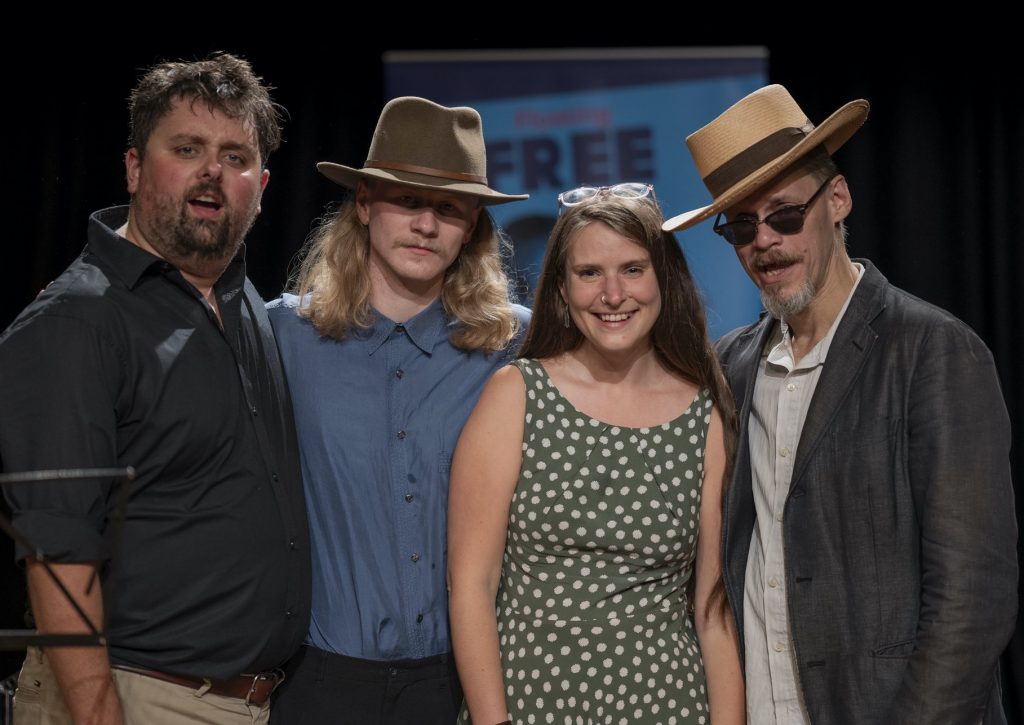Jazz singing is the art that often beguiles with the idea that complexity is easy to deliver by substituting manner for emotional matter. The mannered jazz singer, reproducing the vocal tricks – or ‘licks’, as musicians call them – that others have established, and moving no further on than trickery, is commonplace. This is maybe because the emotions are not always deep and their surface irony and wit do not require much vocal interpretation.
Little of that could be levelled at Welsh singer Sarah Meek, who quickly latches on to the narrative of a song when there’s one to explore and, in any case, has no interest in monopolising the musical content of a chart, deferring equally and at length at this Abergavenny gig for Black Mountain Jazz to the other members of her quartet – saxophonist Jack Mac, bassist Nick Kacal, and drummer Ryan Thrupp.
The instrumentalists are members of the BMJ Collective, a ‘squad’ of performers, many of them associated with the Royal Welsh College of Music and Drama in Cardiff, who are being drawn upon to create a house band for visiting guests at the club’s Melville Theatre base. They provided the accompanying trio for saxophonist Simon Spillett at the last BMJ event, a survey of the music of Tubby Hayes.
Meek is a protégé of the late and lamented Tina May (incidentally, Spillett’s partner), and it was May’s upbeat version of the words Norma Winstone wrote for Steve Swallow’s and Carla Bley’s Ladies in Mercedes that she chose to present here. The song provided an early indication, to be repeated often throughout the evening, of the disciplined ways in which the instrumentalists brought matters to a conclusion, in this case with Thrupp allowing his hands to do the work of sticks and brushes.
Meek’s innovation on the Sammy Cahn-Jules Styne ballad I Fall in Love Too Easily, a chart made famous as a jazz vehicle by Chet Baker, was to have the structure poised between triple and common time (its original signature), not to sound as languorous as trumpeter Baker’s vocal rendition, and to draw from the lyrics not a little of its potential for self-reproach.
It would have been easy for Meek to sing every song straight to a rhythm accompaniment, with one or other of Mac’s trio of saxes – tenor, alto, soprano – on hand to seek melodic variety in choruses seemingly arbitrary in number, but the predictable is not her way. Tom Waits’s Take It With Me, was constructed as a vocal-bass duo with soprano sax intervention and Jimi Hendrix’s Let Me Stand Next to Your Fire an opportunity for Mac to whip up a sax storm with a Hendrix guitar solo not far from his mind. On the Meek original, Waves, the singer not only personalised the lyric but did so with a judicious use of stop-time.
She was sparing in her employment of scat, the wordless vocalese with which most who give little thought to the music believe is synonymous with jazz singing. It were almost as if, in Duke Ellington’s In A Mellotone, which opened proceedings, she wished to get it out of the way before Kacal and Mac went on their lengthy travels, only to reprise it while Kacal and Thrupp traded choruses. But if one wanted the sometimes tiresomely ubiquitous scatting to mean something in musical and contextual terms, she was the audience’s guide.
Mac, a large but not obtrusive musical presence, took tenor-sax control on Meek’s witty treatment of Jerome Kern’s The Way You Look Tonight and shared the convoluted head of Charlie Parker’s Anthropology with Meek scatting in unison at the juncture where vocally nothing else would do unless you were an Annie Ross. There was more heartfelt story-telling from Meek at slow tempo in Confessin’, its pace dictated by Kacal, and Latin moods in Antonio Carlos Jobim’s Agua de Beber, where Thrupp not unexpectedly came into his own. Matters grew almost orchestral as Meek and the band conflated Madonna’s Material Girl and Britney Spears’s Toxic, proving that jazz can almost always be relied upon to cover rock and pop charts with plenty of heft and originality.
This was a quartet in which the singer was primus inter pares and, admirably, not a bit eager to make it one in which she sang and the others filled in behind. Meek has been featured on Jazz FM’s survey of jazz in Wales and there’s an EP due which also involves Kacal as player-producer. It’s all happening, as it did here, and will no doubt continue to do so with similar equanimity and strength of feeling.
Quartet on song: (l to r) Jack Mac, Ryan Thrupp, Sarah Meek, Nick Kacal
Photographs: Kasia Ociepa
Nigel Jarrett is a former daily-newspaperman and the author of seven books, including the short story collection Funderland, which was favourably reviewed in the Guardian, the Times and the Independent and short-listed for the Edge Hill Prize. His first poetry collection, Miners At The Quarry Pool, was described by Agenda magazine as ‘a virtuoso performance’.
He is a freelance writer and his work is represented in the Library of Wales anthology of 20th– and 21st-century short fiction. He is the winner of the Rhys Davies Prize for short fiction and the Templar Shorts Prize. Templar published his story pamphlet. A Gloucester Trilogy, in 2019.
His fictional memoir, Notes from the Superhorse Stable, appeared from Saron Publishing in Spring 2022, and his fourth story collection, Five Go To Switzerland, from Cockatrice Books in autumn of that year.
For many years, he was chief music critic of the South Wales Argus.
He lives in Monmouthshire and writes as a freelance for Jazz Journal (to which he contributes a regular column), Wales Arts Review, Nation.Cymru, Arts Scene in Wales, and others
